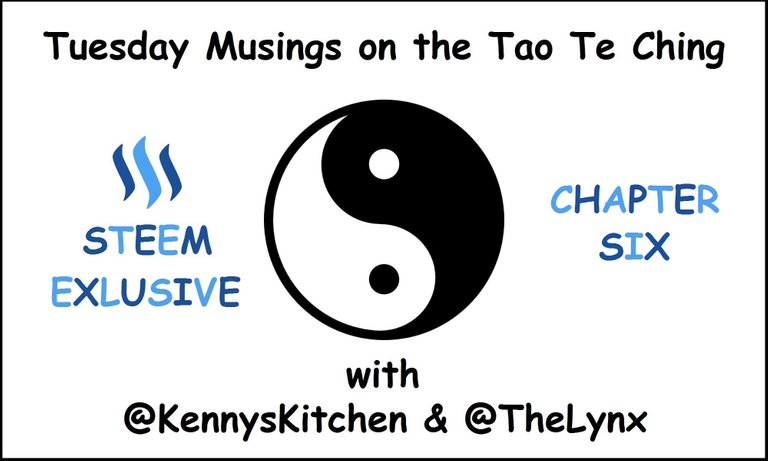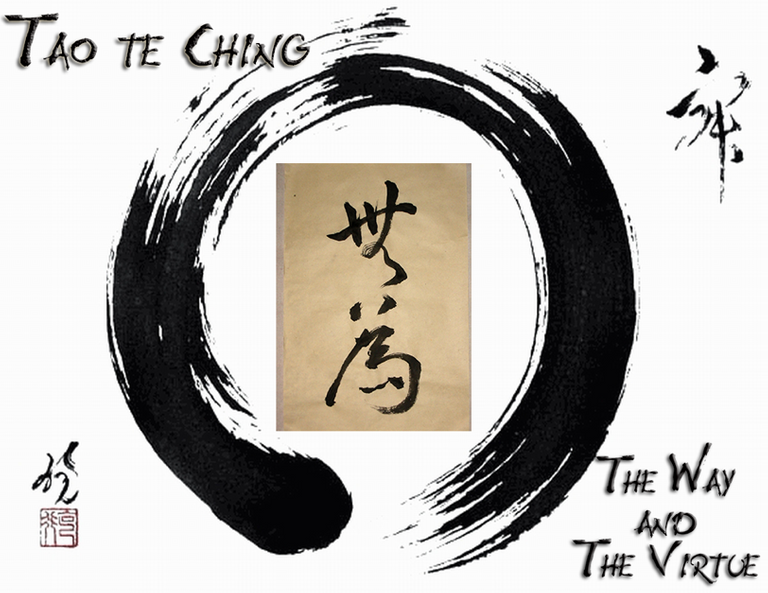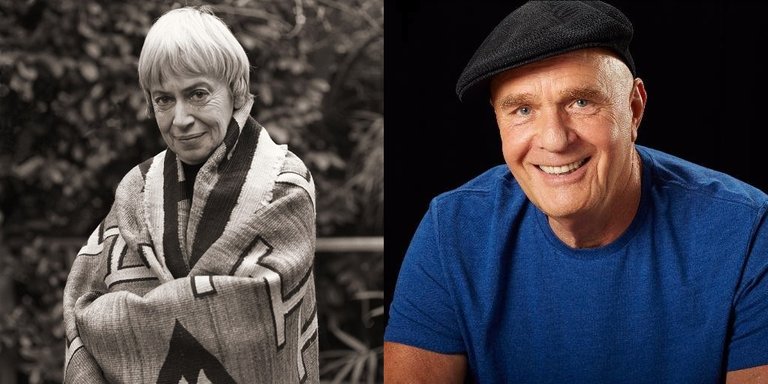
Welcome to the sixth installment of Tuesday Musings on the Tao Te Ching, a weekly series where my partner @TheLynx & I take a look at the Tao Te Ching (pronounced "Dao/Dow De/Day Jing"), one chapter at a time.
The Tao Te Ching was written by Laozi/Lao Tzu at least 2400 years ago. Although there are certainly a wide variety of texts and teachers that have come together to form the basis of modern Taoism, the original Tao Te Ching is central. It's been translated hundreds of times, and it is certainly one of the most influential spiritual texts of modern humanity.
To be perfectly clear, neither of us is an "expert" on the Tao, or even consider ourselves Taoist, and we are not trying to come across as any sort of authority figures. Just two humans meditating on the text and sharing what comes up for us, hopefully starting a conversation with you folks!
The most difficult part of setting this up is picking which translation of the Tao Te Ching to use, since obviously it wasn't written in English, and we can't read classical (or any other version) of Chinese. We've finally settled on using just 9 different translations for each chapter. 7 of them (and the original Chinese) will be included as a screenshot (from 2 sites that each offer a variety), while the other two will be included as quotes in the text body of the posts.
- YellowBridge - Original Chinese & 3 translations:
- TranslationComparison - 4 translations:
- DC Lau (1964)
- Ursula K. Le Guin (1997)
Previous Chapters

Chapter 6
The spirit of the valley never dies.
This is called the mysterious female.
The gateway of the mysterious female
Is called the root of heaven and earth.
Dimly visible, it seems as if it were there,
Yet use will never drain it.
The valley spirit never dies.
Call it the mystery, the woman.The mystery,
the Door of the Woman,
is the root
of earth and heaven.Forever this endures, forever.
And all its uses are easy.


My Thoughts/Reflections/Insights
It seems as though the references to valley match up with those to emptiness, which I guess makes sense as a valley is relatively empty, at least compared to a forest or a mountain range. The spirit of that valley (or of perennial spring as Goddard put it), is the woman, the mystery. At this point, the connection doesn't seem to make a whole lot of sense.
Moving to the next line though, the door/gate of the woman is the root of heaven & earth, "gives birth to infinite worlds", is the source. With this additional context, the reference to the Tao, to that which leads to creation, as a female becomes more clear. The valley is the womb of the Universe, and through the doorway of that valley, all is born.
We may not see the Tao, but it is always there. No matter how much is created or destroyed, the underlying foundation of reality remains. Finally, the idea of Wu Wei returns, effortlessness being the key to using the Tao.
Overall, this chapter feels very similar chapters 1, 4, and 5, focusing on the intangibility of the Tao, and its absolute necessity for the existence of all that is. The themes of endless flowing and easeful, effortless use return again as well, and certainly resonate with my understanding of the Law of Attraction, which seems more and more like another name for the Tao.
Thoughts/Reflections/Insights from @TheLynx
So often when things are thought of as female in the culture I was raised in, it's because they are objectively useful or beautiful: a boat, a car, an instrument. In this Chapter the Tao is described as female for its vastness, darkness, mystery, and depth, as well as its endless fertility.
Multiple translations of this chapter refer to the passivity of the Tao, suggesting that in order to use and embody the Tao we must also be yielding and receptive. Yet the primordial female is vibrant and active as well: ever issuing, ever nurturing, ever living, forever enduring.
Derek Lin interprets:
[T]here is one chapter (chapter 6) specifically devoted to the Mystic Female — the universal feminine energy — while its masculine complement is not addressed anywhere in the Tao Te Ching.
This doesn’t mean the ancient Chinese were into male bashing. What it does mean is that they observed the world from an impartial, objective perspective, and came to the realization that the miracle of life could only occur through women. We simply do not live in a universe where male and female creatures share in the task of giving birth equally. Therefore, it must be true that women possess a certain divine power that men do not. This is a stark realization that deals with reality exactly as it is.

Thoughts/Reflections/Insights from Ursula K. Le Guin
After @TheLynx & I each sit with the chapter of the week and write our own reflections & insights, I'm going to include here the comments that Ursula added to her translation of the Tao. If you aren't familiar with Le Guin, I highly recommend reading any & all of her content that you can find :-) She's a wise, inspirational, curious, and delightful author of science fiction, fantasy, poetry, and much more!
For this particular chapter, Ursula didn't make any notes..
Affirmation by Dr. Wayne Dyer
The final piece of our piece on each chapter of the Tao is an affirmation, written by Dr. Wayne Dyer, and featured in his book: Living the Wisdom of the Tao. Dyer was one of the foremost names in self-development, having published well over 30 books, as well as guided meditations, and many more useful tools for transformation.
I pay attention
to my inner callings
and apply my
own uniqueness
to everything
I undertake.

Join the conversation!
Here's the part where we hear from you! If you have anything that you want to add to the conversation, please hop down to the comments section. By reflecting & synthesizing together, we can all help move forward human consciousness, and that is a pretty fun thing!
Image Sources
YellowBridge Translations
TTC Translations
Le Guin
Dyer
Conversation

If you enjoyed this, you may enjoy some of these highlights of my blog:



I love this, thank both of you for posting an insightful message on the tao. The interpretations can be conveyed from a variety of perspectives. I do see the feminine aspect in the chapter you have presented today. Please continue posting these. The word will get out and those that are meant to receive the information you are giving will find you. I will be back next tuesday.
Thanks! It's been quite a journey already. This is the first time I've ever dived into a holy text in this way, picking it apart and writing my thoughts, rather than simply reading it. We'll see you next week!
You just got splashed by @rewards-pool. For more information on delegating to the @rewards-pool click the following link.
https://steemit.com/steemsilvergold/@rewards-pool/introduction-to-rewards-pool
@rewards-pool where a small delegation can get you a big splash.
wonderful insight! I have been meaning to read this book for a long time, it was recommended by my teacher. Looks like I can read it now nice work thanks 💯🐒
Thanks! I've read through it before, but never in this slow, methodical, systematic way... It seems like Lao Tzu actually said that we shouldn't think about it so much, so make your own decision how to go about it :-P
Great looking forward to catch up on it all. Also thanks for the introduction to Steempeak cracking platform 👍🏽 💯🐒
I saw this post was not autovoted. Did we change things?
Just the usual fun of an auto-voter that only sometimes works :-) I spend about 1.5 hours a day keeping up with things because the automation isn't that clean.
Woo! Love your post - we've given you a 100 percent upvote with a chance to be featured in the weekly curation. We encourage you to use the #naturalmedicine tag so we can more easily find you.
If you're a supporter of all things natural healing, and haven't already got on board our collective, you might like to read our introductory post here. We'd also love to welcome you on Discord here!!
We are also holding a challenge at the moment for a chance to win Steem. You can read the original post here and entries close this Sunday. We'd love for you to enter!.
Hi @kennyskitchen!
Your post was upvoted by @steem-ua, new Steem dApp, using UserAuthority for algorithmic post curation!
Your UA account score is currently 6.298 which ranks you at #205 across all Steem accounts.
Your rank has improved 1 places in the last three days (old rank 206).
In our last Algorithmic Curation Round, consisting of 248 contributions, your post is ranked at #22.
Evaluation of your UA score:
Feel free to join our @steem-ua Discord server
Hello dear how are you just ask you what is @tribsteemup can I join our community ..I am new member
Thanks for this @kennyskitchen.
I was looking for a decent translation of the Tao te Ching a few months ago wanting to contemplate Lao Tzu's words, or better to say signposts, to stillness. After going to my local library I couldn't find anything that wasn't some type of scholarly analysis rather than a translation. The links in your post have provided me with a collection to compare and contrast.
Also, I didn't know Le Guin had made a translation! She is one of my favorite authors and the Earthsea trilogy particularly holds a deep spiritual subtext for me. It shouldn't have surprised me that she was influenced by the Tao
With so many references to creation through naming, and the magic of Earthsea so bound up in that creation
I found my first true inspiration to write poetry the first time I read the Toa te Ching many moons ago when I was 17 years old and this has reminded me why. It has started me thinking about maybe writing some poetry on steemit in response to each chapter. Food for thought :-)
This was probably one of the verses that grabbed my attention all those years ago, and certainly one of the ones that got me into translation work.
The line about the “mysterious female” is sooo enigmatic!
Xuán means dark, mysterious, but also deep or profound so it’s an adjective used in context of our sense or how we perceive.
Pìn interestingly is used to denote the female of a species, so it’s not quite correct to translate it as ‘woman’ (especially as there is a character for that). I’ve always wondered if translators have shown their biases here, wanting to try to show the Taoists as Goddess-worshippers, or perhaps to differentiate them from the patriarchal Christianisation in that sense.
But here’s the other interesting thing about this word — it also means a ‘deep gorge’! Given in the previous line there is mention of “the undying spirit of the valley”, it seems obvious to me to go with this translation.
I think like you said @KennysKitchen, this verse is part of the ‘mystic’ stream of verses, so it’s using the metaphor of a valley or gorge as an empty space to draw attention to how to conceive of the Tao. Certainly in the texts from the much later Quanzhen Tao school, this idea of a ‘Void’ is used to explain what there was(?) before existence came into being— because somethingness can only emerge out of nothingness in the same way that only an empty cup can be filled. And this referenced to the next line 玄牝之門 xuán pìn zhī mén which is the ‘gate of the dark/deep gorge’ being where then Heaven and Earth (the original, primal duality) emerged from. The cosmology continues to explain that it’s is this first duality that create the conditions from which all the 10,000 things (the infinite diversity of existence) also emerge.
I think it’s very easy to see how it is the females who give birth to life acts as the model to explain something which by its nature can not be described: the Void. I think the characterisation of The Void as feminine is modeled on human experience, not the other way around. Pregnancy and birth are the actual, lived experiences which these sages then used as the model to explain how the universe works.
What I find really ironic is that it could seriously be argued that here is an example of explicit matrifocal cosmology... and yet China during this period was so patriarchal. I wonder if Taoists were kinda not trusted by Confucianists because their ideas threatened patriarchal culture and rule to a degree?
Anyway, these are my musings.....
Thanks again for holding this space. It’s a pity it always takes me a few days to come across it. The next verse is an important one for medicine...
😊🙏🏽☯️
This is by far the closest allusion to Gnostic mythology. The light and darkened wombs...